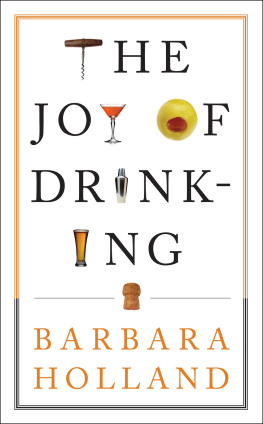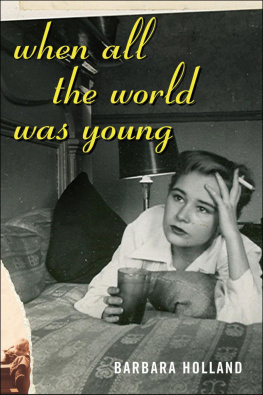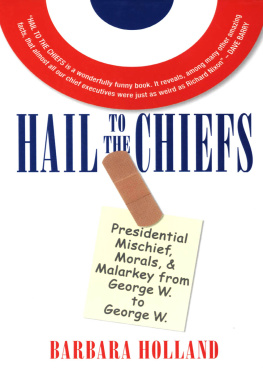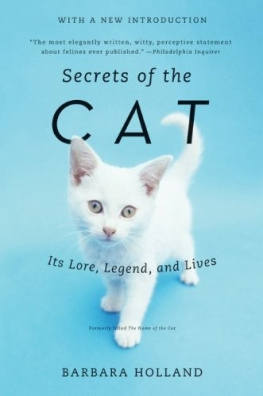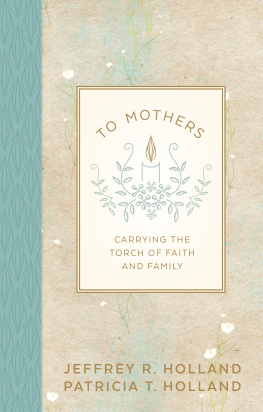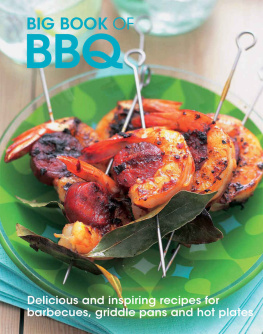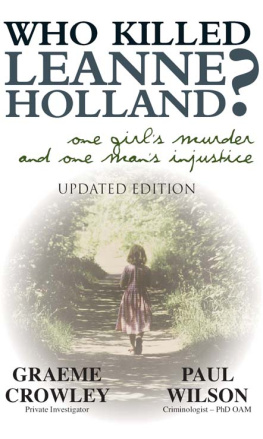In Private Life
Secrets of the Cat: Its Lore, Legends, and Lives
Hail to the Chiefs: Presidential Mischief, Morals, and Malarkey
from George W to George W
One's Company: Reflections on Living Alone
Endangered Pleasures: In Defense of Naps, Bacon, Martinis,
Profanity, and Other Indulgences
Bingo Night at the Fire Hall: Rediscovering
Life in an American Village
Katharine Hepburn
Brief Heroes and Histories
Wasn't the Grass Greener?: Thirty-three Reasons Why
Life Isn't as Good as It Used to Be
They Went Whistling: Women Wayfarers, Warriors,
Runaways, and Renegades
Gentlemen's Blood: A History of Dueling from
Swords at Dawn to Pistols at Dusk
When All the World Was Young: A Memoir
The Joyof
Drinking
BARBARA HOLLAND

Copyright 2007 by Barbara Holland
All rights reserved.
You may not copy, distribute, transmit, reproduce, or otherwise make available this publication (or any part of it) in any form, or by any means (including without limitation electronic, digital, optical, mechanical, photocopying, printing, recording, or otherwise), without the prior written permission of the publisher. Any person who does any unauthorized act in relation to this publication may be liable to criminal prosecution and civil claims for damages. For information address Bloomsbury USA, 1385 Broadway, New York, NY 10018.
Published by Bloomsbury Press, New York
Bloomsbury is a trademark of Bloomsbury Publishing Plc
Library of Congress Cataloging-in-Publication Data
Holland, Barbara.
The joy of drinking / Barbara Holland.
p. cm.
1. Drinking of alcoholic beverages. I. Title.
eISBN: 978-1-59691-806-1
First U.S. Edition 2007
To find out more about our authors and books visit www.bloomsbury.com. Here you will find extracts, author interviews, details of forthcoming events and the option to sign up for our newsletters.
Contents
Quickly pass the social glass,
Hence with idle sorrow!
No delayenjoy today,
Think not of tomorrow!
THOMAS LOVE PEACOCK
Here on my scruffy, untamed mountainside in northern Virginia, if you stand on the kitchen steps and pitch a rotten peach into the woods, in a few years you will have a fine peach tree. In years when May doesn't spring a sharp freeze and the squirrels don't, for reasons inscrutable, harvest the unripe crop, you will have more peaches than anyone can possibly eat or freeze.
It has always been so here. Long before, and during, and after Prohibition, my region was so famous for its peach brandy that the rich from all over the Northeast flocked here to stock up. Even the most industrious farmers learned early on that loading their carts with ripe peaches and trucking them to the market to sell at fluctuating unreliable prices while they bruised and rotted was no way to do business. Brandy was easy, portable, compact, and lasted pretty much forever. And among congenial company, more fun than eating peaches.
Farther north, the colonials drank their apples. It was easy. In an abandoned orchard, apples unpicked on the trees ferment themselves in the fall and possums climb up, get drunk, and fall down on their backs. Apples could be simply squeezed and the juice left around for a few days. Without modern preservatives, it turned into a two-fisted drink, but not a very respectable one; it was mostly for breakfast, not for dinner guests. Distilled, it turned into apple brandy, American cousin to Normandy's Calvados, the French workingman's eye-opener. Applejack was apple brandy distilled by freezing or simply mixed with straight alcohol.
The nostalgic notion of the family orchards is lovelyall that wholesome fresh fruit for our forebears to sit on the back steps biting intobut basically we were growing it to drink. So were people growing cashews, or sugarcane, or barley, or palms.
Some ten thousand years ago our ancestors gave up wandering around eating whatever came to hand and settled down to raise crops. Planting and harvesting was much more work than picking whatever they passed by, but incentives came with it. If you could stay in one place and cultivate fairly stable crops of peaches, rice, apples, berries, grapes, honey, potatoes, barley, wheat, milk, cactus, corn, sugarcane, coconuts, or practically any other organic substance, even if you didn't understand the science involved, it would presently ferment into a drink that made you forget your troubles and feel better about life.
William Faulkner, who knew a thing or two about it, observed that civilization begins with fermentation. For the record, fermentation is what happens when the glucose molecule is degraded to two molecules of the two-carbon alcohol known as ethanol, and to two molecules of carbon dioxide. It involved yeast, easily made by every husbandman and housewife from potato water and hops, or simply found naturally in various sources, as common as germs and everywhere, lurking on grapes, drifting into tubs of barley, settling on unpicked apples. Strictly speaking, yeasts are Saccharomycetaceae, or microscopic fungi. They feed on sugar, including the sugar in almost everything edible, and transform it into a drink with a punch.
The important thing was staying in one place instead of drifting, so things had time to ferment. The longer you waited, the more powerful the product, though some fruits, like mangoes, turned alcoholic almost as soon as they ripened, and even small birds passing by for a snack got too drunk to fly. And some fruits are just natural intoxicants; last year in South Carolina a flock of cedar waxwings came to grief after eating the holly berries in a downtown business park. The heady juice is irresistible and at least a hundred of them, flying drunk, crashed into a glass-paneled office building. Half of them died on impact.
In 2004 archaeologists dug up a batch of elegant, graceful jugs in the prehistoric village of Jiahu in China and found them to be between eight and nine thousand years old. Chemists inspected their contents: they'd been used for a wine made of rice, beeswax, and hawthorn fruits or wild grapes. Traces of similar brews had been found in the Middle East dating to around ten thousand years ago.
According to the evidence, their villages dated from the same time. Archaeological chemist Patrick McGovern observed, "The domestication of plants, construction of complex villages, and production of fermented drinks began at the same time in both regions."
Agriculture, drink, and social life walked in holding hands. We stopped living in mutually hostile family groups, scouring the brush for berries and beetles and throwing rocks at other families, and clustered together into tribes to grow and ferment crops. Having discovered conviviality, we moved our living quarters closer together and quit trying to kill each other on sight. Visited the neighbors. Shared a few drinks. Learned to work and play together. Had a few beers.
Beer has been called the cornerstone of civilization, though many claim honey's mead came first. Scholars speculate that a bowl of barley, first domesticated in the Near East, was left out and got wet, so the grain germinated and then was visited by airborne yeasts and foamed up, and somebody drank it and was pleased. That theory lays a lot of weight on a single bowl of Near Eastern barley With no communication between peoples and areas, how did drinking spread so far so fast?
It seems almost like a supernatural inspiration, a blessing draped simultaneously over the peoples of the earth, and it seemed so to the ancients too, since before anyone understood yeast, natural fermentation was a glorious and often divine mystery. In Mexico the Aztecs drank pulque made from the agave plant, which graciously turned alcoholic just from being exposed to air. It was sacred. Getting drunk on it in a secular way was a capital crime, at least for the masses, while staying sober on it during religious ceremonies was equally illegal: The Aztec gods, particularly Tepoztecal, god of drunken merriment, had sent pulque as a miracle to the people and wanted to see it appreciated until everyone passed out cold.
Next page
